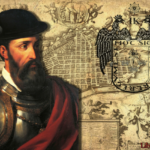When I was a schoolboy (the Punic Wars q.v.), Bonaparte’s genial idea was called ‘The Continental System’, a good name but implying a kind of applied plan to Continental economics, rather than a sustained attempt by him to ruin the British nation economically, and force it to sue for peace. In this sense the word ‘blockade’ is more appropriate. It is surprising however, that such a violent word, in these days of euphemism and political correctness, should emerge in the most modern history books – when the word ‘system’ appears infinitely more euphemistic and more politically correct.
The System emerged during the climax in a trade war with Britain that had begun during the French Revolutionary Wars (q.v.), 1792-9. Britain was using her vast navy to cut off French exports/imports to and from her colonies overseas.
The Battle of Trafalgar (1805 q.v.), persuaded Bonaparte that he could not invade Britain unless he had control of the seas, which he manifestly had not. So being who he was he took another route: he would ruin the British Isles by cutting off all exports to Europe and over the Atlantic Ocean.
First the Berlin Decrees (1806) disallowed France from trading with Britain. No more French wines on a rich man’s table. No more frogs’ legs. Britain replied pretty quickly with the Orders in Council, which compelled neutral ships trading with France to call at a British port . . . and pay a duty there!
Bonaparte’s reaction was the Milan Decree (1807) declaring that all ships calling at a British port would automatically become a prize for the taking. It is obvious that there was a dual purpose in this Continental System or Blockade: the Emperor thought that by preventing British exports to Europe, the British economy would implode; the people would starve because the way in to British ports would be blocked (hence – ‘blockade’). Thus, thought Napoleon, British participation in the Napoleonic Wars would end.
In addition, he wanted British monopolies over trade in Europe to be broken, naturally to be replaced by France’s. Goods from France to other parts of the French Empire were freed from tax, while goods entering France had to pay heavy duties. In order to make his System more effective, Napoleon ordered conquered countries such as Prussia and Russia at the Treaties of Tilsit (1807 q.v.) to join in the fun, and made France’s frontiers longer by annexing Holland, and a part of the North German coast.
But could the Blockade work? Smuggling, always a profitable if dangerous trade, was extensive through Holland, Sweden, Spain, Portugal and Malta. Bonaparte himself pulled the carpet away under it by granting certain trade licences with Britain. Unbelievably, when the crops failed in England in 1810, he allowed large shipments of grain to get to Britain from France! Napoleon thought that by making England pay for the grain in gold, he would bankrupt her. But it did not work. In fact, seaports in France suffered th most from the Blockade, and other areas took the benefit, protected from British competition, and able to export to the captive markets of the French Empire.
European textile industries boomed, as did arms manufacture. The Blockade contributed a great deal to Napoleon’s downfall. He thought he might enforce it by invading Spain, which he unwisely did in 1807. Spain is one of those countries it is better not to invade, as by doing so Bonaparte had not only to face Spain’s military defences assisted by Wellington’s armies, but also the inhabitants of every village and town armed with knives, men, women and youths perfectly prepared to die for their country at a time when patriotic feelings ran high. He lost the disastrous Peninsula War (q.v.). Then at last, the final folly; as Tsar Alexander (q.v.) had withdrawn Russia from the System, Bonaparte invaded Russia. This extraordinarily erroneous notion ended the Napoleonic Wars and caused his abdication, imprisonment first on the island of Elba, and, following Waterloo, death on the island of St. Helena.









Leave A Comment